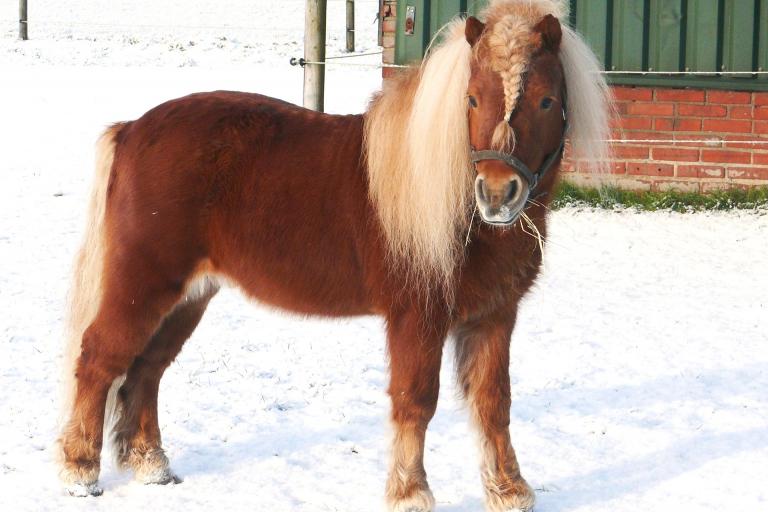ACAN Dwarfism | Chondrodysplasia (ACAN Horse)
In ACAN dwarfism, abnormal cartilage growth leads to skeletal problems and painful dwarfism. Four different disease-causing variants of the ACAN gene are known to date: D1, D2, D3* and D4. All variants show a very similar phenotype and thus the painful dwarfism in Miniature Horses and Shetland Ponies. Affected ponies are often euthanized due to poor quality of life. The disease is inherited autosomal recessively.
Genetic Test: available in Shop
Symptoms
- Globular head
- Shortened torso/neck
- Enlarged joints
- Bowed forelegs
- Underbite
- Cleft palate (resulting in difficulties breathing)
- Pain
General Information
- Four causative variants for ACAN dwarfism have been identified and validated so far: D1, D2, D3* and D4.
- All variants show similar phenotypes and lead to dwarfism in Miniature Horses and Shetland ponies.
- An affected pony may have two of the same, or two different variants. Any combination with D1 results in early spontaneous abortion of the affected foal (D1/D1, D1/D2, D1/D3*, D1/D4).
- Other combinations show the phenotype described above. Symptoms may vary from mild to severe.
- Affected ponies are often euthanized because of poor quality of life.
- Some combinations are very rare (D3*/D3*, D4/D4). The effects of these genotypes on the horse’s phenotype are yet unknown.
- Originally five different variants have been reported to cause the ACAN dwarfism. The original D3 variant has been proven incorrect, and the fifth variant reported (Metzger et al. 2017) been named D3*. CAG tests for this corrected D3* variant.
- Another form of dwarfism also results in health issues in Shetland ponies and Miniature Horses: Skeletal Atavism (SA, Del-dwarfism). It is possible for ponies to be carriers of both ACAN and SA.
Test Information
The test detects all four variants of the ACAN gene.
D1: g.95291270del
D2: g.95284530C>T
D3*: g.95282140C>G
D4: g.95257458_95257500del
Test in Shop
Genotype and Lab Report
Inheritance: autosomal recessive
→ Only animals with two copies of the variant (d/d) are affected. Animals with only one copy (N/d) are clinically normal carriers. "d" stands for D1, D2, D3* or D4.
Genotyp
N/N = normal
The horse/pony has no copies of the mutations causative for ACAN dwarfism and therefore cannot pass it on to its offspring.
N/d = carrier
The horse/pony is a clinically normal carrier. The variant will be passed on to its offspring with a probability of 50%.
d/d = affected
The variant will be passed on to all offspring. All offspring will be carriers (N/d).
Any combination with the D1 variant will lead to early abortion of the affected foal.
Recommendations
- Carriers may be bred to normal animals (N/d x N/N) without any risk of producing affected offspring. The offspring should also be tested before breeding to determine if they are carriers or normal.
- Breeding two carriers (N/d x N/d) is not recommended due to the possibility of 25% of the offspring being affected.
- Affected animals (d/d) should not be used for breeding.
Literature
Eberth, J.E. : Chondrodysplasia-Like Dwarfism in the Miniature Horse. Theses and Dissertations–Veterinary Science. Paper 11. Entire thesis is available at http://uknowledge.uky.edu/gluck_etds/11:, 2013.
Metzger, J., Gast, A.C., Schrimpf, R., Rau, J., Eikelberg, D., Beineke, A., Hellige, M., Distl, O. : Whole-genome sequencing reveals a potential causal mutation for dwarfism in the Miniature Shetland pony. Mamm Genome 28:143-151, 2017. Pubmed reference: 27942904. DOI: 10.1007/s00335-016-9673-4.
Further information is available at: Online Mendelian Inheritance in Animals

